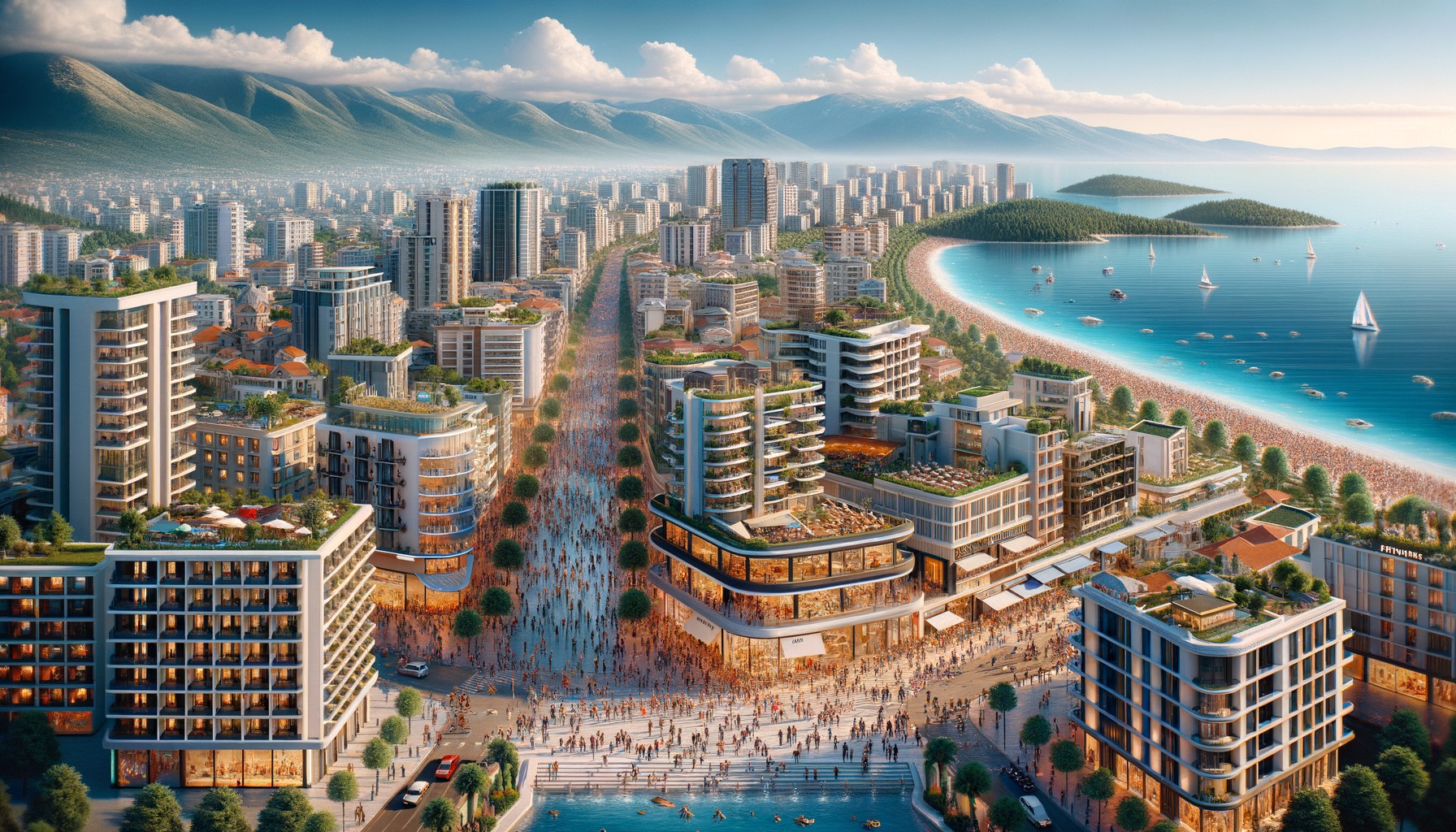
Albania — Tourism growth is transforming the country's economy, rental market and budget
In recent years, Albania has transformed itself from a little-known destination into one of Europe's fastest-growing tourism hubs. Previously overshadowed by its Balkan neighbors, the country is now attracting record numbers of international visitors, causing significant changes to its economy, real estate market and government budget. In 2023-24, Albania set a new record for tourism recovery, with hotel overnight stays up 56.8% after the COVID-19 pandemic and an impressive 84.7% compared to pre-Covid 2019. This explosive growth has propelled Albania to a leading position in Europe, outpacing the recovery of most EU countries. Particularly impressive is the influx of international visitors, which increased by 81.7% year-on-year. This demonstrates Albania's growing attractiveness in the international tourism market and its ability to compete with traditional European destinations.
Factors of success of Albanian tourism
The key reasons for the rapid growth of the tourism industry in Albania are:
- Unique natural and historical resources — Albania has a luxurious and diverse nature, including hundreds of kilometers of untouched beaches, crystal clear sea, picturesque mountains, historical cities and castles. This makes the country attractive to a wide range of tourists.
- Competitive prices — compared to popular European resorts, Albania offers more affordable prices for accommodation, food and entertainment, which attracts budget tourists and families.
- Liberal visa policy — Albania maintains a loyal policy towards foreign visitors, providing visa-free entry for citizens of many countries and simplified visa procedures.
- Development of transport infrastructure — the growth in the number of low-cost flights and the improvement of the quality of roads have made Albania more accessible to tourists from Western Europe, the Balkans and other regions.
- Diversity of tourism products — Albania offers a wide range of tourism activities, from dynamic festivals and adventure holidays to quiet family beach tourism, which allows to satisfy the needs of different categories of travelers.
Impact of the tourism boom on the rental market
The sharp increase in tourist flow has caused a real surge in demand for rental housing in Albania. Many tourists prefer apartments and houses instead of traditional hotels, which stimulates the development of the private sector and attracts investment in the construction of new properties.
- Expanding supply and rising prices — the greatest increase in the supply of rental housing is observed in coastal regions such as Saranda, Vlora, Valona, Durres, as well as in the major cities of Tirana and Shkodra.
Local owners have the opportunity to significantly increase their income from renting out real estate, while foreign investors see the Albanian market as a promising investment platform, given the relatively low prices of real estate and the high potential for growth in return on investment. The rental market boom has led to a significant increase in property prices, especially in popular tourist locations. This, in turn, indirectly stimulates the development of related industries such as construction, architecture, property management and services. - New opportunities and challenges — the rapid growth of tourism and demand for rental housing creates both new opportunities and certain challenges for Albania:
- There is a need to modernize domestic infrastructure and services to meet international standards and the expectations of foreign guests.
- Rising rental prices may negatively affect the availability of housing for the local population, which requires a well-thought-out policy for regulating the real estate market.
- Rapid construction and increasing pressure on natural areas raise important environmental issues that require the introduction of sustainable practices and careful attitude to the environment.
- Seasonal fluctuations in demand and a shortage of skilled labor in the tourism industry create additional challenges for the employment market.
Install our app and get all the tools you need to search for real estate abroad in your smartphone! The mobile application will allow you to quickly access your personal account, manage your favorite properties and track your requests, directly exchange messages with sellers and buyers.

Economic impact and impact on the state budget
Tourism plays a key role in the Albanian economy, generating a significant portion of the country's GDP (pre-pandemic, its share was estimated at about 27%). The record influx of tourists and the growth of investment in the sector provide a sustainable increase in state budget revenues due to:
- Taxes on the hotel business, rent and related services.
- Growth of employment in tourism, construction, transport and trade.
- Development of small and medium-sized businesses related to guest services, including cafes, restaurants, tour operators and excursion services.
- Increase in foreign exchange earnings from foreign tourists, which contributes to the stabilization of the national economy.
The tourism boom also stimulates the influx of domestic and foreign investment in infrastructure development, the construction of new accommodation facilities and the modernization of existing resorts. This creates a multiplier effect for the economy, supporting the growth of employment and income in related industries.
Prospects for the development of tourism in Albania
Albania has confidently established itself as one of the most dynamic and promising new tourist destinations in Europe. In terms of growth rates and the percentage of new guests and overnight stays, the country has outpaced many traditional tourist markets such as Spain, Italy, Greece and Croatia.
- Factors of sustainable growth — current trends indicate the formation of a sustainable demand for holidays in Albania, based on the following factors:
- A unique combination of natural and historical attractions that attract a wide range of tourists.
- Competitive prices and a favorable price-quality ratio compared to other European destinations.
- Growing recognition and positive image of Albania in the international tourism market.
- Development of transport accessibility and improvement of the quality of infrastructure and service.
- Challenges and opportunities for further development — in order to maintain positive dynamics and realize the potential of the tourism industry, Albania will have to solve a number of important tasks:
- Invest in the development of infrastructure, including the modernization of roads, airports, housing and communal services and improving the quality of service to international standards.
- Purpose a balanced policy of regulating the rental market, taking into account the interests of the local population and investors, in order to avoid a «tourist bubble» and maintain the affordability of housing.
- Ensure sustainable tourism development taking into account environmental factors, introducing green building practices, rational use of resources and protection of natural areas.
- Develop new tourism products and destinations in order to diversify the offer and attract different categories of tourists all year round.
In conclusion, we note that Albania is at the peak of its tourist popularity, effectively using its unique natural and historical resources, as well as the «novelty» effect for the European market. An unprecedented boom in the industry is turning the country from a post-Soviet outsider into a new pearl of the Balkans with a rapidly growing rental market, a reliable flow of foreign and local investments, a strengthening economy and a renewed image on the world tourist map. The record growth of tourism in Albania not only attracts foreign visitors and investment, but also creates new opportunities for the local population by stimulating the development of small and medium-sized businesses, creating jobs and increasing income in related industries. The state budget also benefits from increased tax revenues and foreign exchange inflows. However, the rapid growth of tourism also poses new challenges for Albania related to the need to modernize infrastructure, regulate the real estate market, protect the environment and ensure sustainable development of the industry. The country's ability to effectively address these challenges will determine the future dynamics of the tourism sector and its contribution to the economy. Albania's experience can become an inspiring example for other countries seeking to develop their tourism potential and diversify their economies.
 6
6
 25.1
25.1  1
1  1
1  1
1  2
2  15
15
 18
18
 4
4

In 2025, the rental market in Germany is undergoing major changes. Tightening energy efficiency requirements, a reform of the social benefits system, the possible abolition of controversial fees and growing demand against a backdrop of limited supply are all creating a new reality for tenants and landlords. We look at the causes, consequences and prospects for these changes.

Albania is experiencing an unprecedented tourism boom that is not only attracting record numbers of foreign visitors, but also stimulating the rental market and generating significant revenue for the government. The increase in tourism is transforming the country’s economy and creating new opportunities for both locals and foreign investors.

In Germany, the new government has announced major changes to migration policy. The accelerated scheme for obtaining citizenship in 3 years is cancelled, restrictions on family reunification and the acceptance of refugees are introduced, and border controls are tightened. We talk about the essence of the reforms, their reasons and impact on migrants and German society.
























